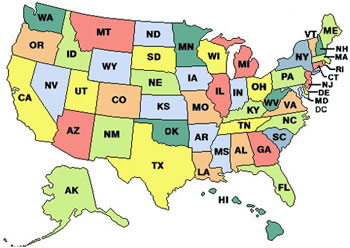 Here are two quick hits today about how resources are going to be divided up among the states.
Here are two quick hits today about how resources are going to be divided up among the states.
First, the Census Bureau gives us a preview of what population growth may look like in the 2010 census with last week’s release of the latest annual population numbers. According to this news summary:
In Nevada, for example, the population has risen 32.27% since the 2000 Census, more than any other state in the past decade. Nevada currently has three seats in the House and will almost certainly pick up another as a result of its population growth.
On the other hand, large states that have grown slowly over the past nine years such as Ohio (1.67%), Pennsylvania (2.64%), New York (2.98%) and Michigan (3.13%) could lose at least one seat each.
The future of the so-called Sand States – California, Arizona, Nevada and Florida – is still in question, though. The rapid rise of many of these states through the early part of the decade has been curtailed by the housing crisis.
Second, this New York Times report explains how states that have already expanded their eligibility rules for Medicaid may see less reimbursement from the federal government than those states that will do so only as part of the health care reform that eventually gets signed into law. An example:
In Arizona, where state revenues are down 31 percent, the governor called an emergency cabinet meeting last week as the Senate bill was advancing and ordered the state to stop accepting applicants to its children’s health insurance program. The state, where voters approved an expansion of Medicaid in 2000, projects that in the first seven years of an overhaul, its share of Medicaid would be $17 billion under the Senate bill. Had Arizona not expanded coverage, the state’s share would have been $1.4 billion, the state estimates.
The issue, it seems, is how beneficiaries are classified as “newly eligible” for benefits. According to Governor Paterson of New York, states that had voluntarily expanded their own Medicaid eligibility rules “are, in a sense, being punished for our own charity.” He has a point.
- Bulenox: Get 45% to 91% OFF ... Use Discount Code: UNO
- Risk Our Money Not Yours | Get 50% to 90% OFF ... Use Discount Code: MMBVBKSM
Disclaimer: This page contains affiliate links. If you choose to make a purchase after clicking a link, we may receive a commission at no additional cost to you. Thank you for your support!



Leave a Reply